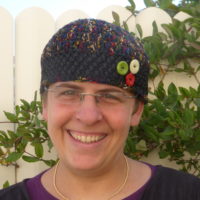Gital Wolf Poupko
Credentials
Finances
- 16 Eitan Livni St., Pisgat Zeev
- Jerusalem, 9758713
Gital Wolf Poupko
 Verified
Verified
Credentials
Expressive Arts Therapist
MA, PhD
Finances
250-350 NIS
N/A
Free Consultation | Student Discount
- 16 Eitan Livni St., Pisgat Zeev
- Jerusalem, 9758713
ABOUT
I am an experienced creative arts therapist, specializing in drama therapy, therapeutic writing and storytelling. I work with children, adolescents and adults of all ages. I see individuals as well as groups. To me, every client is unique. I must earn his/her trust, and I am attuned to his/her particular pace, needs, strengths and vulnerabilities. Thus, we may incorporate various techniques, such as Gestalt, guided imagery, mindfulness and authentic movement within the sessions. I believe the therapeutic process can activate the imagination, creativity, playfulness and healing potential inherent in every human being. My main areas of expertise include: loss and bereavement, anxiety, stress management, life transitions, depression, interpersonal skills, self esteem and wellness. I have worked extensively with youth and adults experiencing learning disabilities and special needs. I am also trained in sex therapy, focusing on female sexuality throughout the life cycle. I am an observant Jew, an avid student of Jewish texts, and particularly sensitive to the needs and preferences of Orthodox and ultra-Orthodox clients. Born in the US and having made Aliyah to Israel as an adolescent, I am fluent in both English and Hebrew, and have a special place in my heart for immigrants (Olim) of all ages and backgrounds. I am moved anew witnessing each client's progress, and feel privileged to play any part in a human being's growth, renewal or healing.
QUALIFICATIONS
MA
Lesley University
2000
PhD
Bar Ilan University
2024
Degree
MAEducation
Lesley UniversityYear of Graduation
2000Degree
PhDEducation
Bar Ilan UniversityYear of Graduation
2024Years in Practice
23
ADDITIONAL CREDENTIALS
Supervisor (# 644) - ICET (2011)
Israel License (Ministry of Health) - #23538
DISTANCE COUNSELING
None
PRIMARY SPECIALTIES
Anxiety / Panic
Depression
Grief
Life Transitions
Self-Esteem
ADDITIONAL SPECIALTIES
Attention Deficit Hyperactivity Disorder (ADHD)
Autism Spectrum
Child Abuse
Divorce / Custody
Learning Disabilities
Sexual Issues
Stress Management
CLIENT FOCUS
Population
Children
Adolescents
Adults
Geriatric
Languages
Hebrew
English
TREATMENT APPROACH
Dance / Movement Therapy (DMT)Dance Movement Therapy (DMT) is a psychotherapeutic approach that uses movement as a medium for self-expression, exploration, and healing. It is based on the belief that the body and mind are interconnected, and that the body is a source of knowledge and wisdom. Through the practice of DMT, individuals are encouraged to explore movement in order to gain insight into their emotional state and gain insight into the underlying causes of their difficulties. The goal of DMT is to help individuals identify, process, and integrate their emotions, thoughts, and behaviors in order to improve their overall well-being.
Drama TherapyDrama therapy encourages clients to express their feelings and solve problems through storytelling, puppetry, role-playing, games, scripts, improvisation, and performance. Through role playing, improvisation, and creative expression, clients can practice scenarios like being in a relationship, or rehearse new skills that they would like to incorporate into their daily lives. Through these activities, the client can explore feelings, gain insight, and increase self-awareness. In addition, the client can gain new perspectives, develop communication skills, and practice problem-solving strategies. Drama therapy can also help build self-confidence and foster resilience.
Expressive Arts TherapyExpressive Arts Therapy is particularly beneficial for clients who struggle with describing what they are feeling verbally. Through imagination and creation of different art forms, clients are able to interpret and communicate their inner world and catalyze healing. Expressive arts therapy can involve the use of multiple modalities, such as visual arts, music, movement, drama, storytelling, poetry, and play. It is used to help individuals of all ages, including children and adults, to explore their feelings, reconcile emotional conflicts, foster self-awareness, manage behavior and addictions, develop social skills, improve reality orientation, and solve problems.
Gestalt TherapyGestalt therapy is an experiential, humanistic approach to psychotherapy that emphasizes personal responsibility, and that focuses on the individual's experience in the present moment. It explores an individual's emotions, behaviors, and thoughts, and how they may be influencing one another. It is rooted in the belief that people are responsible for their own experience, and that they can make conscious choices to improve their lives. The goal of gestalt therapy is to help individuals gain insight into their current experiences and to become aware of how their behaviors and thoughts shape their present reality.
Play TherapyPlay therapy is an evidence-based, developmentally appropriate form of intervention used to facilitate emotional, cognitive, and social growth in children. Play therapy is based on the premise that play is the child's natural medium of self-expression and can be used to assess and help a child work through difficult emotions, thoughts, and behaviors. The goal of play therapy is to help children develop the skills and abilities to navigate life stressors, and build self-esteem. During treatment, the therapist creates a comfortable, safe environment (a playroom) for the child to play with as few limits as possible. The toys in the playroom are intended to encourage the child to express his or her feelings and develop healthier behaviors. The child’s “play” with these toys serve as the child’s symbolic words, which may be difficult to express otherwise.
See Far CBT, Bibliotherapy, Sex Therapy, Mindfulness
SERVICES OFFERED
Individual Therapy
Clinical Supervision
Group Therapy
Workshops/Educating

 Verified
Verified 
